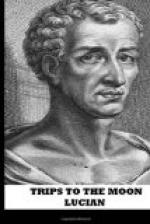These men seem not to know that poetry has its particular rules and precepts; and that history is governed by others directly opposite. That with regard to the former, the licence is immoderate, and there is scarce any law but what the poet prescribes to himself. When he is full of the Deity, and possessed, as it were, by the Muses, if he has a mind to put winged horses {25a} to his chariot, and drive some through the waters, and others over the tops of unbending corn, there is no offence taken. Neither, if his Jupiter {25b} hangs the earth and sea at the end of a chain, are we afraid that it should break and destroy us all. If he wants to extol Agamemnon, who shall forbid his bestowing on him the head and eyes of Jupiter, the breast of his brother Neptune, and the belt of Mars? The son of Atreus and AErope must be a composition of all the gods; nor are Jupiter, Mars, and Neptune sufficient, perhaps, of themselves to give us an idea of his perfection. But if history admits any adulation of this kind, it becomes a sort of prosaic poetry, without its numbers or magnificence; a heap of monstrous stories, only more conspicuous by their incredibility. He is unpardonable, therefore, who cannot distinguish one from the other; but lays on history the paint of poetry, its flattery, fable, and hyperbole: it is just as ridiculous as it would be to clothe one of our robust wrestlers, who is as hard as an oak, in fine purple, or some such meretricious garb, and put paint {26} on his cheeks; how would such ornaments debase and degrade him! I do not mean by this, that in history we are not to praise sometimes, but it must be done at proper seasons, and in a proper degree, that it may not offend the readers of future ages; for future ages must be considered in this affair, as I shall endeavour to prove hereafter.
Those, I must here observe, are greatly mistaken who divide history into two parts, the useful and the agreeable; and in consequence of it, would introduce panegyric as always delectable and entertaining to the reader. But the division itself is false and delusive; for the great end and design of history is to be useful: a species of merit which can only arise from its truth. If the agreeable follows, so much the better, as there may be beauty in a wrestler. And yet Hercules would esteem the brave though ugly Nicostratus as much as the beautiful Alcaeus. And thus history, when she adds pleasure to utility, may attract more admirers; though as long as she is possessed of that greatest of perfections, truth, she need not be anxious concerning beauty.




